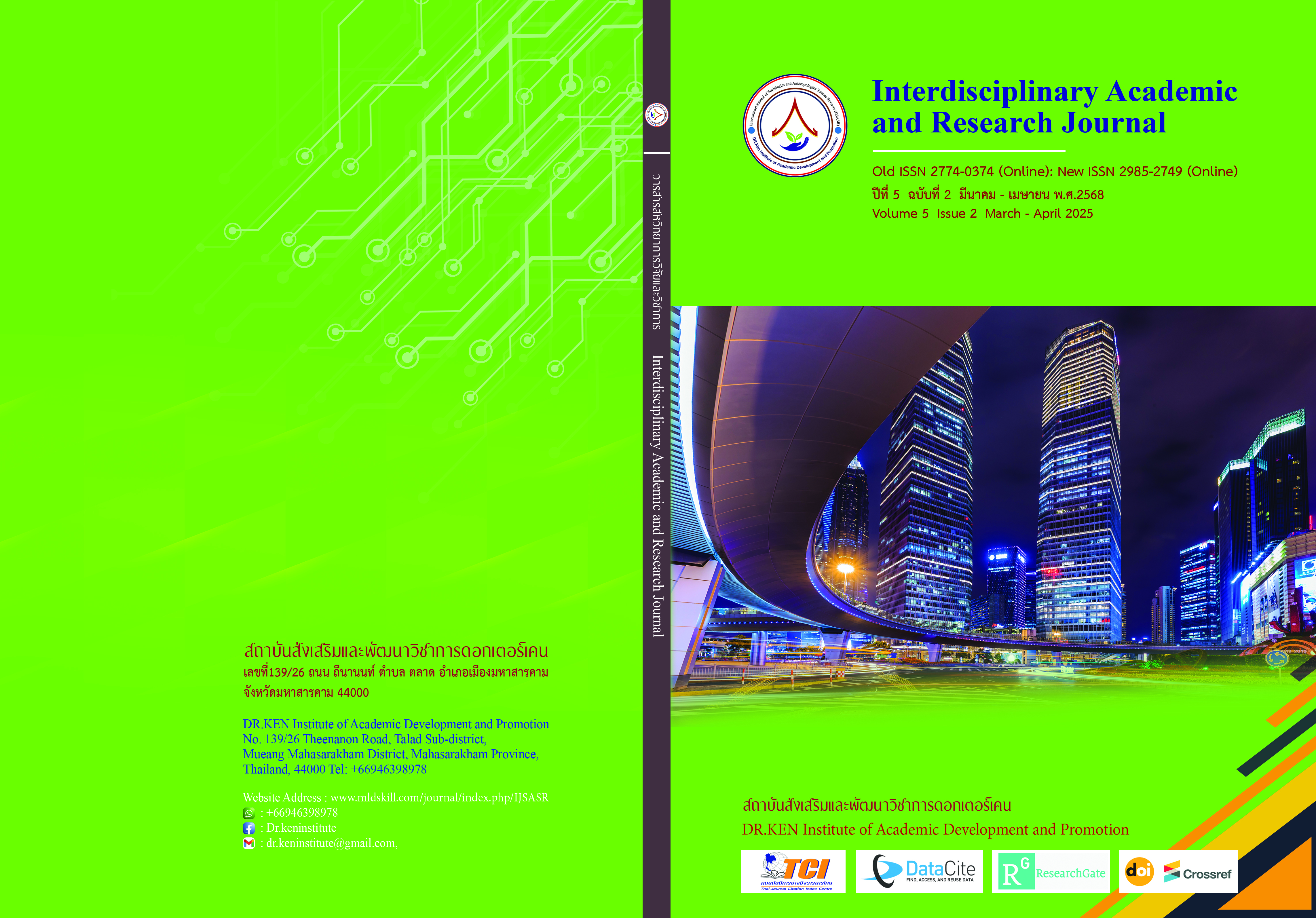The Effects of an Empowerment Program on Self-care Behaviors of the Elderly at Baan Lao Tama Health Promoting Hospital, Non-Daeng Subdistrict, Borabue District, Maha Sarakham Province
DOI:
https://doi.org/10.60027/iarj.2025.281346Keywords:
Elderly, Self-care Behavior of the Elderly, Empowerment ProgramAbstract
Background and Aims: Thailand has now entered an Aged Society. The elderly population, being a group that experiences rapid physical deterioration, is more likely to encounter health issues than other age groups. Promoting self-care by providing knowledge and empowering the elderly can enable them to take care of themselves effectively. This study aims to compare the self-care behaviors of the elderly before and after participating in the program in the experimental group and to compare the self-care behaviors between the experimental and control groups after participating in the empowerment program in the Ban Lao Tamai Subdistrict Health Promoting Hospital's service area, Non-Daeng Subdistrict, Borabue District, Maha Sarakham Province.
Methodology: This research is quasi-experimental. The sample size was determined using the formula for estimating the proportion of the population when the total population is known, resulting in 70 people per group. Data were collected using a questionnaire comprising two parts: general information and self-care behavior of the elderly. The data were analyzed using descriptive statistics such as frequency, percentage, mean, and standard deviation, as well as inferential statistics, including paired t-tests and independent t-tests.
Results: The study results from a total of 140 elderly participants, divided into an experimental group of 70 people and a control group of 70 people, showed that the self-care behavior of the elderly in the experimental group had a significantly higher average score after participating in the program, with an increase of 6.39 points. Moreover, the average score of the elderly in the experimental group was significantly higher than that of the control group (p<0.001).
Conclusion: Thus, this study demonstrates the effectiveness of the empowerment program on the self-care behaviors of the elderly. The elderly in the experimental group who participated in the program exhibited significantly improved self-care behaviors compared to the control group, indicating the success of using the empowerment program in the elderly population.
References
เอกภพ จันทร์สุคนธ์, อนงค์นาฏ คงประชา. (2560). ผลของโปรแกรมเสริมสร้างพลังอำนาจต่อพฤติกรรมการดูแลตนเองของผู้สูงอายุในชุมชน. วารสารของคณะวิทยาศาสตร์และเทคโนโลยี มหาวิทยาลัยราชภัฏพิบูลสงคราม, 2(1), 24-34.
กลุ่มเสริมสร้างและพัฒนาศักยภาพเครือข่าย กองส่งเสริมศักยภาพผู้สูงอายุ. (2564). สังคมผู้สูงอายุในปัจจุบันและเศรษฐกิจในประเทศไทย. Retrieved 3 January 2024, from https://www.dop.go.th/th/know/15/926.
กานดา สุขสมบูรณ์. (2561). ผลของการมีส่วนร่วมของชุมชนในการส่งเสริมสุขภาพผู้สูงอายุ. วารสารสาธารณสุข, 35(2), 211-220.
จิราพร ชุ่มชื่น. (2561). การศึกษาผลของโปรแกรมการออกกำลังกายในผู้สูงอายุที่มีข้อจำกัดทางร่างกาย. วารสารเวชศาสตร์ครอบครัว, 26(3), 203-210.
ธรรมนงค์ คำชาลี. (2566). ประสิทธิผลของรูปแบบการส่งเสริมสุขภาพผู้สูงอายุโดยการเสริมสร้างพลังอำนาจและกระบวนการมีส่วนร่วมของชุมชน ตำบลโนนคูณ อำเภอยางชุมน้อย จังหวัดศรีสะเกษ. วารสารวิจัยและพัฒนาสุขภาพศรีสะเกษ, 2(2), 1-15.
บรรลุ ศิริพานิช. (2559). สถานการณ์ผู้สูงอายุไทย พ.ศ. 2559. กรุงเทพมหานคร: สถาบันวิจัยประชากรและสังคม มหาวิทยาลัยมหิดล.
ปราโมทย์ ประสาทกุล (บรรณาธิการ). (2560). รายงานสถานการณ์ผู้สูงอายุไทย พ.ศ. 2560. กรุงเทพ: มูลนิธิสถาบันวิจัยและพัฒนาผู้สูงอายุไทย.
วรรณภา ศรีธัญรัตน์, ผ่องพรรณ อรุณแสง, อัมพร เจริญชัย, สุจิตรา ลิ้มอำนวยลาภ และกัลยา พัฒนศรี. (2559). การสังเคราะห์องค์ความรู้เพื่อจัดทำข้อเสนอการปฏิรูประบบบริการสุขภาพและการสร้างหลักประกันสุขภาพสำหรับผู้สูงอายุไทย. สถาบันวิจัยระบบสาธารณสุข.
วิเชียร เกตุสิงห์. (2538). สถิติที่ใช้ในการวิจัย. กรุงเทพฯ: กองการวิจัย, สำนักงานคณะกรรมการการศึกษาแห่งชาติ.
วิไลรัตน์ สุขเกษม. (2562). การเสริมสร้างพลังอำนาจเพื่อปรับปรุงพฤติกรรมสุขภาพในผู้สูงอายุ: การศึกษาทางคลินิก. วารสารสุขภาพจิตแห่งประเทศไทย, 31(4), 301-309.
สมชาย สมสุข, พรพรรณ เพ็ชรปาน. (2563). ผลของโปรแกรมเสริมสร้างพลังอำนาจต่อพฤติกรรมการดูแลสุขภาพในผู้สูงอายุ. วารสารการพยาบาล, 30(2), 54-65.
สำนักงานสาธารณสุขจังหวัดมหาสารคาม. (2566). รายงานประจำปี. มหาสารคาม: สำนักงานสาธารณสุขจังหวัดมหาสารคาม.
อำพร นามสี. (2562). บทบาทของครอบครัวต่อการเสริมสร้างพฤติกรรมสุขภาพในผู้สูงอายุ: การวิจัยเชิงคุณภาพ. วารสารการแพทย์ชุมชน, 28(1), 89-97.
Cochran, W.G. (1953). Sampling Techniques. New York: John Wiley & Sons.
Gibson, C. H. (1995). The process of empowerment in mothers of chronically ill children. Journal of Advanced Nursing, 21(6), 1201-1210.
WHO (2019). Health Impact Assessment (HIA) – The Determinants of Health. Retrieved from: https://www.who.int/hia/evidence/doh/en/
Downloads
Published
How to Cite
Issue
Section
License
Copyright (c) 2025 Interdisciplinary Academic and Research Journal

This work is licensed under a Creative Commons Attribution-NonCommercial-NoDerivatives 4.0 International License.
Copyright on any article in the Interdisciplinary Academic and Research Journal is retained by the author(s) under the under the Creative Commons Attribution-NonCommercial-NoDerivatives 4.0 International License. Permission to use text, content, images, etc. of publication. Any user to read, download, copy, distribute, print, search, or link to the full texts of articles, crawl them for indexing, pass them as data to software, or use them for any other lawful purpose. But do not use it for commercial use or with the intent to benefit any business.
















.png)


